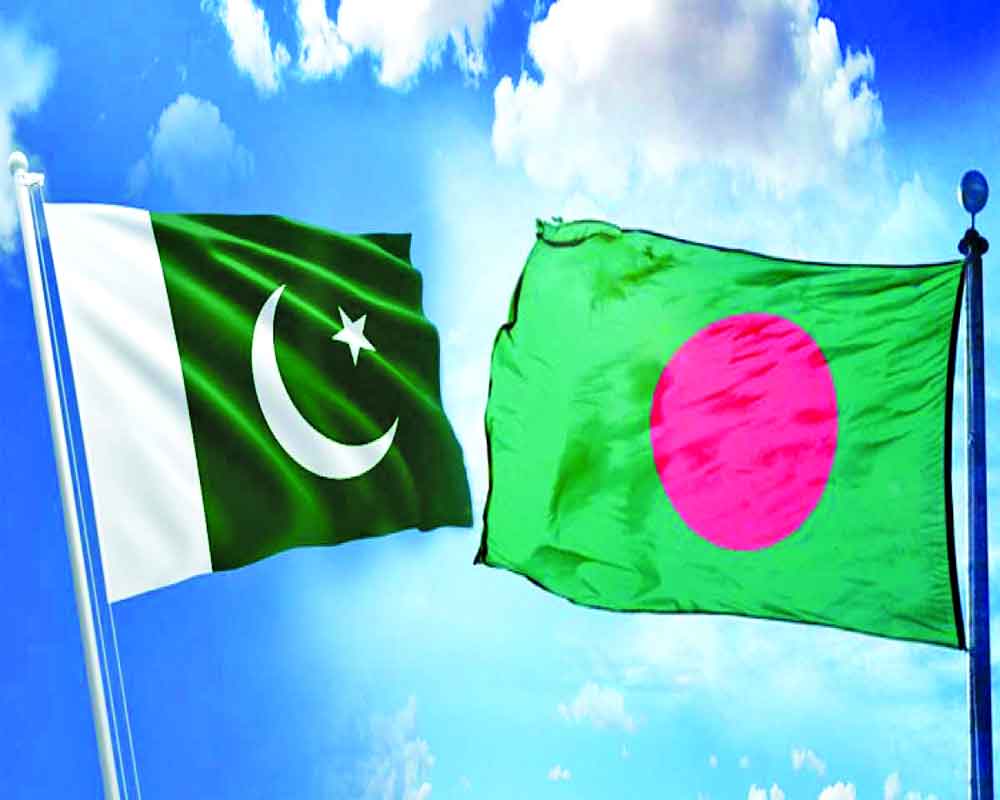Pakistan and Bangladesh charted their course differently, while former was fixated with the ‘two nation theory’ latter adopted a liberal approach
Two nations emerged from non-contiguous territories in 1971, one willingly and the other unwillingly, after violently disproving a religion-based assumption i.e., the ‘two-nation theory’ that beset the ‘Idea of Pakistan’. Over fifty years since, both these countries have invested and institutionalized a starkly different path, trajectory, and consequently an inevitable socio-economic narrative. Bangladesh under Bangabandhu Sheikh Mujibur Rahman had inherited a land subjected to genocide and plunder that had ensured shipment of anything of value to West Pakistan (soon, just Pakistan) – even in defeat, Pakistani leadership had displayed unbelievable avarice and wantonness. While newly independent Bangladesh had gone about putting its ravaged house in order, Pakistan had simply refused to learn any lessons. The Pakistani leadership baton passed from its defeated dictator, General Yahya Khan, to an equally unhinged, imperious, and morally compromised, Zulfiqar Ali Bhutto. Instead of reflecting on its regressive underpinnings of the ‘two-nation theory’, Pakistan under the civilian leadership of Zulfiqar Bhutto further strengthened its religio-populism with puritanical moves – he appeased the pernicious clergy, declared Ahmadis as heretics, recklessly funded the ‘Islamic Bomb’, banned alcohol (even though he drank himself), etc. Whereas Mujibur Rahman decided to walk a
contrarian path in terms of land reforms, nationalization, and perhaps the most revolutionary of all, adopted the word ‘secularism’ in its newly adopted constitution. It had inadvertently modeled itself like another Muslim-majority Turkey (of Kemal Ataturk’s
sensibilities, not Erdogan’s) – whereas Pakistan after tenures of Zulfiqar Bhutto and General Zia-ul-Haq went on a sliding slope of a total abyss.
Indeed, Bangladesh’s story was not linear or smooth and it had to deal with its subliminal regressions, natural disasters, and frequent disruption to democracy. Mujibur Rahman himself toyed with a one-party state and censorship when things were not going in his favour. He was assassinated in a military coup. Bangladeshi Military soon rewrote the constitution obliterating the word ‘secularism’ and the same was reinstated only in 2010, when the Bangladesh Supreme Court ruled that the removal was illegal, leaving Bangladesh with a coexistent State religion and the principle of ‘secularism’, to imply neutrality of religion. Again, the phenomenon of Pan-Islamism and political Islam has not spared Bangladesh either, yet in relative terms, Bangladesh under the current Awami League government has not gone the Pakistani route of religious puritanism.
Importantly, Sheikh Hasina has insisted, “You live in equal rights. You will observe your religion and celebrate festivals with equal rights. This is the real policy of Bangladesh and our ideal. I urge you never to think of yourself as a minority”. While there have been multiple communal issues and provocations in Bangladesh, at least the leadership has spoken in favour of religious pluralism. Contrast this with Pakistan even in recent times, with the former Imran Khan (popularly known as Taliban Khan) promising a ‘Riyasat-e-Madina’ and even the current coalition government has Maulana Fazlur Rehman, the emir of Jamiat Ulema-i-Islam, as its Presidents! These political-societal wirings have inevitable socio-economic consequences owing to governance structures and choices and therefore the contrasting fate of current Pakistan and Bangladesh is only natural. This week the headlines from Bangladeshi newspapers were ‘Metro Rail transported 3.35 lakh commuters since opening’, ‘Two committees formed over mistakes and errors in textbooks’, ‘cancellation of Jamaat’s registration’, ‘Bangladesh to get $4.7 bn IMF package’ etc., Whereas the headlines from across the Line-of-Control (LOC) were ‘Death toll from an attack on mosque rises to 92’, ’35-rupee hike in petrol prices, ‘failed policy of suing for peace with terror group’ and ‘No IMF loan, a mission to visit Pakistan for talks on 9th review’! A combusting Pakistan grapples with abject political, financial, diplomatic, security, and social failure. On easily securing the IMF loan as opposed to a Pakistan, Bangladeshi Finance Minister said, “This loan approval proves that our economy is standing on a solid foundation and our fundamentals are better than many other countries”. However, the Pakistani Finance Minister in 2023 was still banking on divine intervention as he stated incredulously, “If Allah can create Pakistan, then he can also protect, develop, and make it prosper”. Pakistan’s fixation with its foundational ‘two-nation theory’ and its inevitabilities have led to imploding relations with neighboring Afghanistan to a perennially tense equation with Iran. Pakistan simply refuses to come to terms with its genealogical flaw, which was wisely skipped by the founding fathers of Indian independence and constitutionality who opted for an inclusive, liberal, and progressive agenda.
Bangladesh went ahead of even India in 2021-22 in terms of per capita income, and this is especially impressive as in 2007 (15 years back), India’s per capita income at $1028 was almost double of Bangladesh at $558. It is the same story with various UN Sustainable Development Goals. The invaluable lesson to India, given that Pakistan suffers from ostrich syndrome and simply refuses to learn, is to put economic and progressive agendas over petty religious ‘divides’ and the supposed rewriting of history. Our politics could look westwards or eastwards for learning different lessons and implications of choices made.
(The writer, a military veteran, is a former Lt Governor of Andaman & Nicobar Islands and Puducherry. The views expressed are personal.)

























